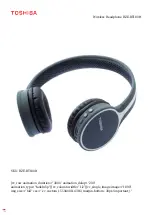
17
•
Keep the metal contacts on top of the battery clean.
•
Don’t attempt to disassemble or short-circuit the Battery.
•
The battery may need recharging if it has not been used for a long period of time.
•
It’s best to replace the battery when it no longer provides acceptable performance. It can be
recharged hundreds of times before it needs replacing.
•
Don’t store the battery in high temperature areas for long periods of time. It’s best to follow
these storage rules:
•
Less than one month:-4
°
F to 140
°
F (-20
°
C to 60
°
C)
•
More than one month:-4
°
F to 113
°
F (-20
°
C to 45
°
C)
● Disposal of Lithium Ion (Li-Ion) Batteries
•
Do not handle a damaged or leaking Li-Ion battery as you can be burned.
•
For safe disposal options of your Li-Ion batteries, contact your nearest service provider’s
authorized service center.
•
Special Note:
Be sure to dispose of your battery properly. In some areas, the disposal of
batteries in household or business trash may be prohibited.




































